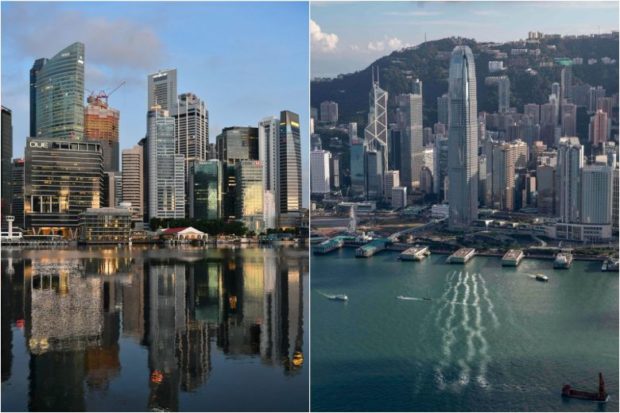
Hong Kong is the 10th place that Singapore has made special travel arrangements with. CHONG JUN LIANG, AFP via The Straits Times/Asia News Network
SINGAPORE — Singapore has announced its first two-way air travel bubble with Hong Kong, paving the way for leisure and other forms of travel between both places.
This means that people will be able to travel between the two locations without the need to be quarantined, subject to conditions including testing negative for Covid-19.
Details are still being worked out, but people could be traveling between both places in several weeks.
Transport Minister Ong Ye Kung on Thursday (Oct 15) called the move a small but significant step for the two aviation hubs, adding that the agreement set the model for more partnerships to come to revive air travel.
Noting that both countries posed a low risk of Covid-19 transmission, he said: “The risk of a Hong Konger bringing the virus into Changi (Airport) is not very different from someone coming from Jurong.”
Under the agreement, travelers will likely be tested before they depart.
There will be no restrictions on segments of the population, itinerary or purpose of travel.
Asked what precautions will be taken to safeguard Singapore from a spike in cases in Hong Kong or other places, Mr Ong said: “There should be a common understanding. We all want to control the virus and the epidemic, but should there be unforeseen circumstances, a spike. I think we will have to suspend (the arrangement).”
He added that this was an initiative which would be done progressively, cautiously, steadily, and safely.
“But we have to open up our aviation sector. We have to try,” he stressed.
“Both of us are important aviation hubs. We both know that the aviation hub concerns the entire economy, not just the aviation industry.”
Hong Kong is the 10th place that Singapore has made special travel arrangements with under the landmark agreement.
There are different types of agreements.
The first is a unilateral opening – a standing invitation from Singapore to countries that have comprehensive public health surveillance systems and have successfully controlled the spread of Covid-19.
Countries in this group are New Zealand, Brunei, Australia – excluding Victoria state – and Vietnam.
Visitors have to apply for the Air Travel Pass that allows all forms of short-term travel, including leisure travel.
The second tier, bilateral green lane arrangements, are for essential business and official travel.
China was the first country to establish a green lane with Singapore. There are also reciprocal green lanes with Malaysia (from Aug 17), Brunei (from Sept 1), South Korea (from Sept 4), Japan (from Sept 18) and Indonesia (applications to begin on Oct 26).
For Malaysia, there is a second scheme in place – the periodic commuting arrangement, for longer-term travel for work and business-related travel.
For other countries hard-hit by the Covid-19 pandemic, travelers have to serve a 14-day quarantine at dedicated government facilities and take a swab test before the end of their quarantine period.
The total number of confirmed Covid-19 cases in Hong Kong has gone past 5,200, including 105 deaths.
The city was hit by a third wave of the pandemic after clusters started popping up in June and quickly worsened in the weeks after, prompting the authorities to roll out the strictest social distancing measures such as mandatory wearing of face masks and capping public gatherings at two, in July.
But health authorities and experts in Hong Kong have warned in recent weeks of a fourth wave of the pandemic in the winter, with some saying it could come earlier if people let their guard down.
Public gatherings are now capped at four and gyms, bars and pubs have been allowed to reopen. Dining-in services at eateries are to end at midnight.